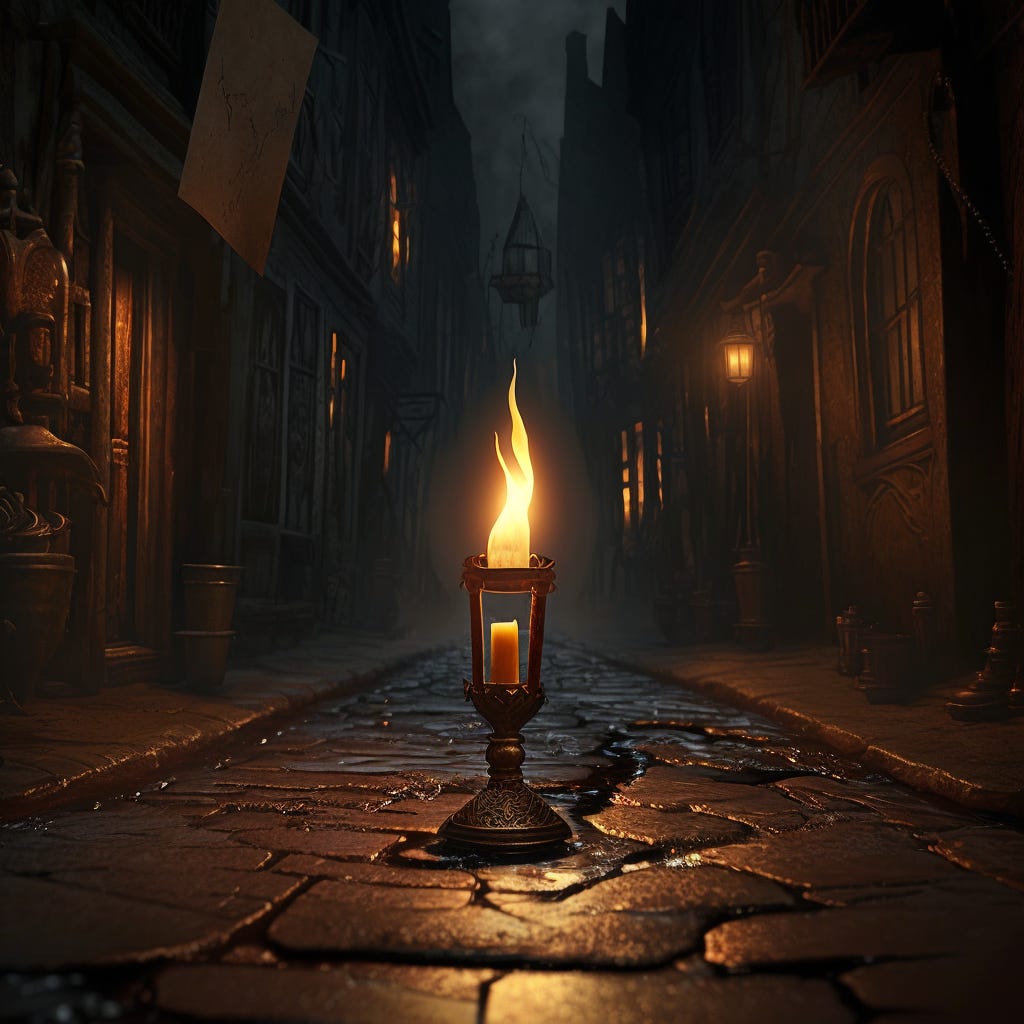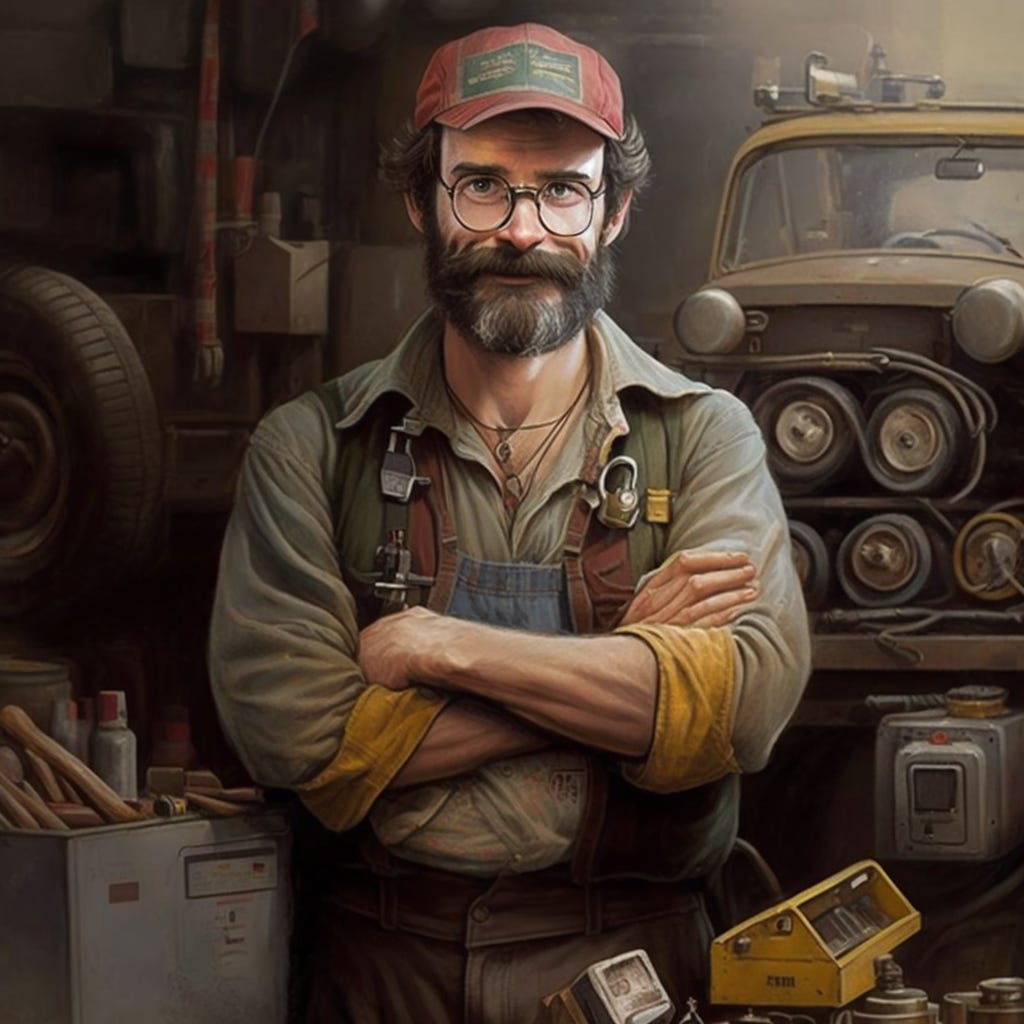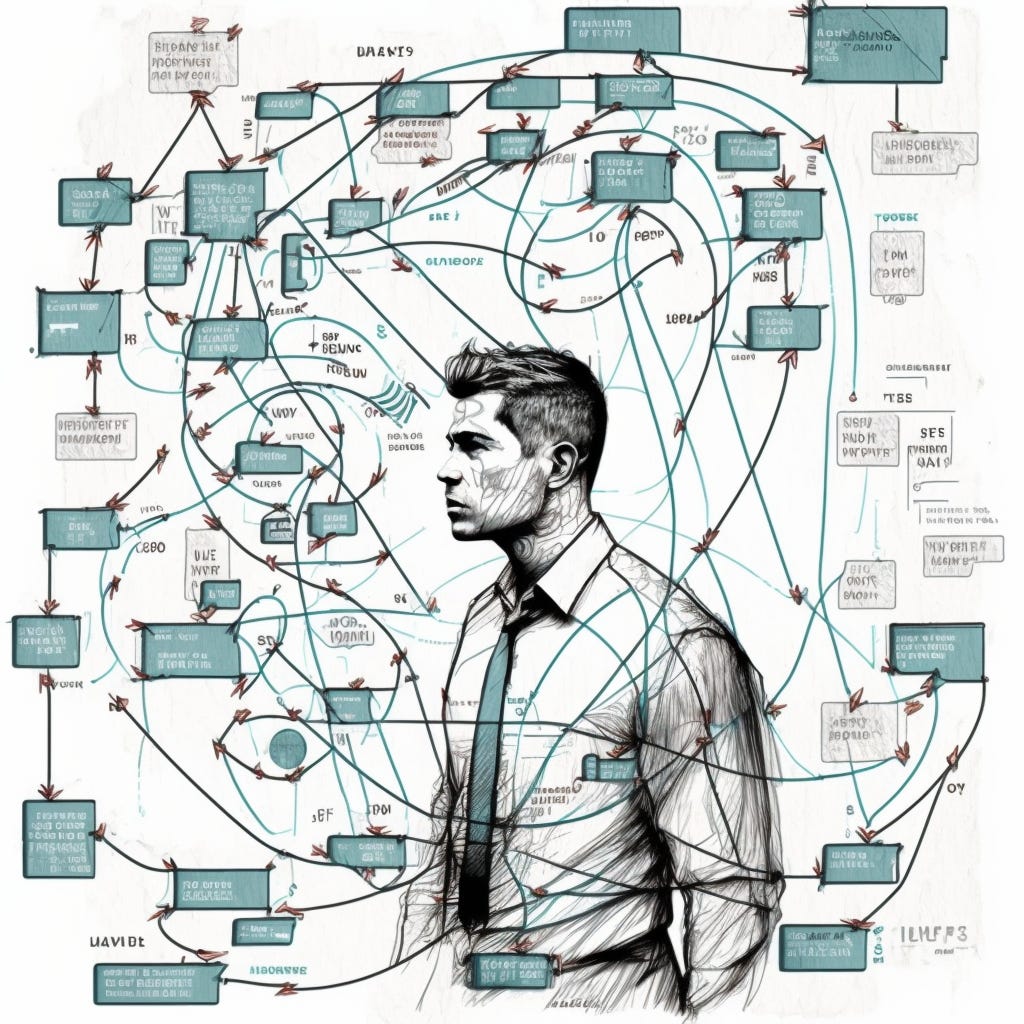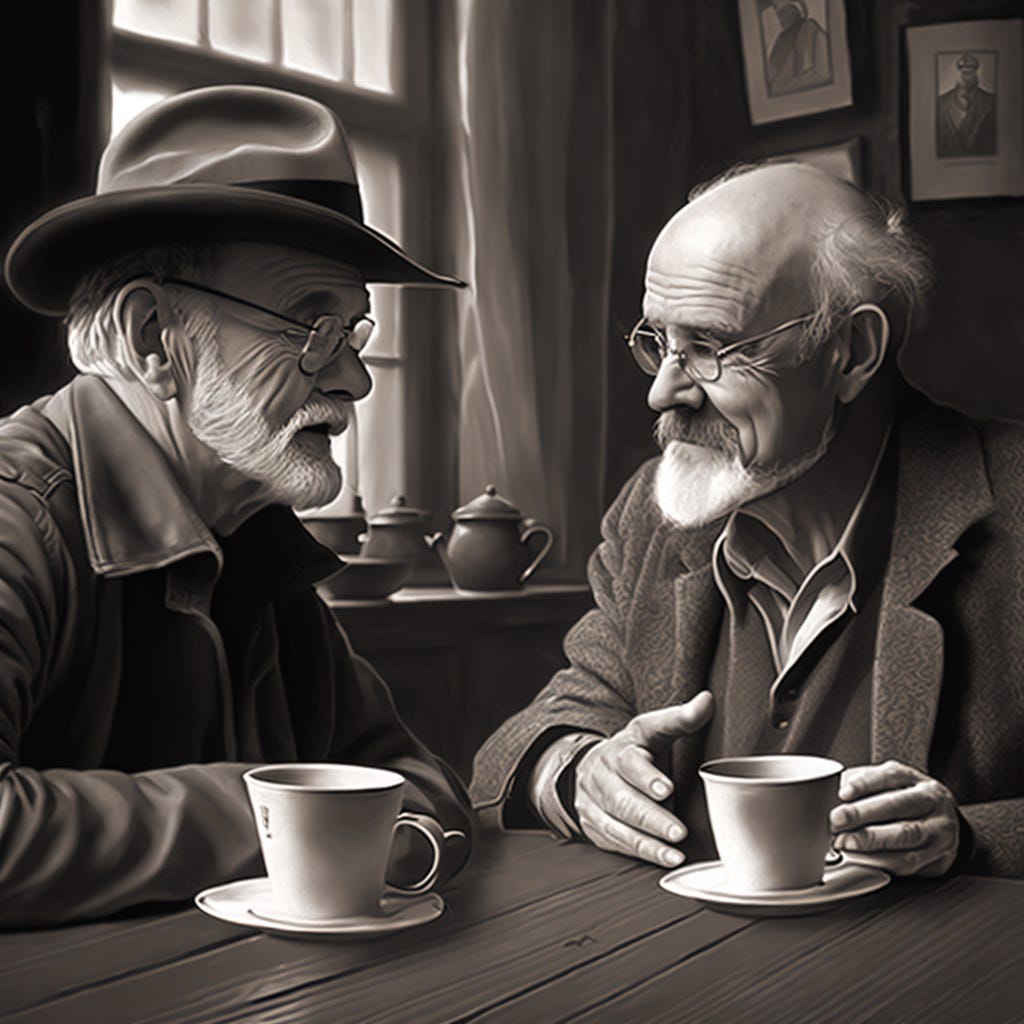Enter The Golem
Terry Pratchett was a master of allusion, constantly enriching his books with masterful remixes of familiar figures, stories and tropes, all of which imbued his novels with a timeless quality – strange, new, and yet somehow carrying the reassuring weight of familiarity. As a youngster, one of his prized possessions was a battered copy of Brewer’s Dictionary of Phrase and Fable – a celebrated compendium of history, folklore, myths, and legends – which he read from cover to cover. This began a lifelong fascination with the strange, fantastical tales that tell us in a thousand different ways where we came from and how we got here (the idea of Discworld itself grew out of several ancient Indian and Chinese myths that imagined a flat Earth carried through space on the back of a giant star turtle).1
Like the legions of psychologists who study fairytales to understand how the human mind attempts to make sense of the world, Terry Pratchett recognised the power and importance of these wild stories because, as he put it, they feed ‘our innate desire to control our world by means of satisfying narratives’.2 I didn’t have a copy of Brewer’s growing up; I got my crash-course in humanity’s attempts to understand itself in the pages of Discworld.
That’s how I learnt about golems. These proto-robots are hulking ‘men’ of clay who work without rest or sustenance, animated by holy words written on a ‘chem’ lodged inside their heads. With no voice of their own, the golems are condemned to obey the chem’s commandments: Thou Shalt Work, Thou Shalt Have a Master, Thou Shalt Not Kill.
They sound inhuman, but the idea of the golem actually comes from one of the oldest human creation myths, as described in the Jewish Talmud. In that holy text, Adam was created by God out of clay and was himself a mere ‘golem’ until the Creator anointed him with the spark of life. During the Middle Ages, Jewish mystical traditions toyed with the idea of making new golems to be faithful servants, imbuing them with life through ritualistic use of Hebrew letters written on a ‘shem’, or carved into the golem’s clay.3
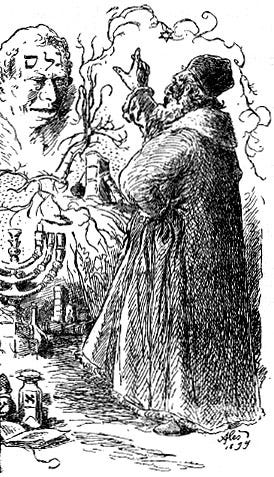
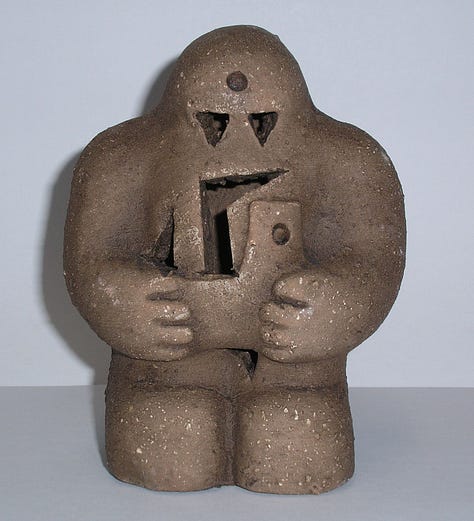
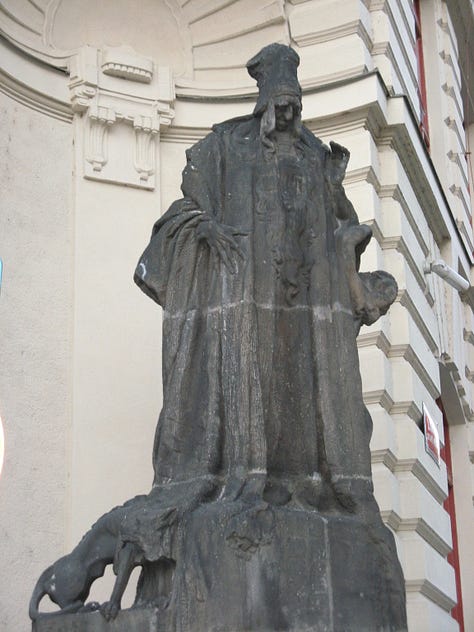
In Feet of Clay, Pratchett transplants the myth of the golem to Ankh-Morpork, where they’re made to work in the dirtiest, harshest, and least desirable jobs. Nobody remembers who made these ancient creatures, or where they came from. They work in the slaughterhouses, down mineshafts pumping water, or trudge tirelessly in giant treadmills to provide power for Ankh-Morpork’s sweatshops and factories. They’re clearly enslaved, but can a machine – even a magical one – really be considered a slave? Work is a golem’s raison d’être, after all.
But by bringing golems to Ankh-Morpork, where they rub shoulders with other races while being treated worse than all of them, Terry Pratchett poses a profound question: what makes us different from these clay creatures? They’re giant, magical beings, but we can all recognise something of ourselves in them.
Their lives are not so different from countless citizens who labour their days away in thankless corporate jobs, or from the life of an ordinary person who’s more or less forgotten why they live the life that they do.
Unlike the more familiar tales of Frankenstein’s monster or the Terminator, this isn’t a story of a mad scientist losing control of their creation. This is a much deeper story of automatons – golem and human – discovering or recovering a sense of agency in their lives. Because, I realised as I fell deeper into the novel, a story about golems is always ultimately a story about ourselves.
Commander Vimes & The Golems Back Home
Last time we saw Vimes, he was in the midst of profound crisis. Faced with the prospect of retirement from the only job he’d ever known, and marriage to a woman far above his social status, he spent most of Men At Arms falling apart. But now, at last, the newly-promoted Commander Sir Samuel Vimes I remember so fondly has arrived on the scene. He’s off the booze, on the job, and – with increasing confidence – beginning to take both his work and himself seriously.
It was a joy to see Vimes firing on all cylinders, but he’s got his work cut out for him in this book. When Lord Vetinari falls deathly ill, it rapidly becomes clear that he’s being slowly poisoned. Vimes needs to find out how and by whom – before it’s too late. Meanwhile, the golems of Ankh-Morpork have created a ‘king’ for themselves, a new golem fashioned from their own clay who (as his Hebrew name, ‘Meshugah’, implies) quickly goes mad and begins to kill.
But as fearful mobs begin to turn on the golems, Vimes has to deal with a different kind of automaton. He takes the lead on the investigation into Vetinari’s poisoning, but after he learns that one of the Patrician’s domestic servants has disappeared from work, his enquiries take him far from the palace and deep into his own history. In the process, he’s forced to confront the life he escaped… and the golem in the minds of the people he left behind.
Vimes grew up dirt-poor in the Shades of Ankh-Morpork, an area described by The Discworld Companion as ‘an inner city area sorely in need of either government help or, for preference, a flame thrower’.4 Vimes was born here, in the ancient and dark heart of Ankh-Morpork, where even postal workers needed an armed escort to deliver the mail.5 But the Shades, like most inner-city areas, isn’t just home to criminals. Some of the city’s poorest people have no choice but to live here too, where they struggle to live a ‘respectable’ working-class life, while always taking care never to get too big for their boots.
This is the British class system in a nutshell – something that Pratchett was acutely aware of, growing up in 1950-60s England as a school drop-out from a working-class family. Terry’s early life was shaped by a mother who believed in the transformational power of education, and a father – a talented mechanic – whose horizons were chiefly defined by the job right in front of him.6 It was a loving, supportive home, but it also gave Terry direct experience of a tension that cuts through the hearts and minds of humanity: the tension between being and becoming; between smelling the roses and striving for more; between the comfort of accepting a clear place in the world and the pain of being unable or unwilling to fit in.
When the investigation leads him back to Cockbill Street, the newly-knighted Sir Samuel Vimes, Commander of the City Watch and richest man in the city, steps directly back into this web of tension. As he makes his way through the shadows on memory lane, he hears the voice of his grandmother ringing in his ears, declaring that ‘No one’s too poor to buy soap’.7 Except, of course, that they were; but they bought soap anyway, because looking presentable was more important than a full stomach.
The Vimes of today is a man caught between two worlds, but increasingly sure that he doesn’t want to live in either. In Men At Arms, Vimes worried that he, a boy from the gutter, had no place among the high and mighty. But much as he hates the entitled corruption of the elite, his warmer feelings towards the people of Cockbill Street – his people – are no less cynical. ‘The common people?’, he says, ‘They’re no different from the rich and powerful except they’ve got no money or power. But the law should be there to balance things up a bit. So I suppose I’ve got to be on their side’.8
As he treads the old, familiar cobblestones, fragments of half-remembered skipping songs and childhood rivalries bubbling back up to consciousness, Vimes is torn between wistful empathy and frustrated scorn. It’s not poverty, he muses, that keeps the people of Cockbill Street treading water and going nowhere, it’s
their vague comprehension that there were rules. And they went through life filled with a quiet, distracted dread that they weren’t quite obeying them.9
They live with this guilt pulsing through their veins as predictably as a heartbeat. They cling to ‘the rules’ as if these were a life-raft rather than a prison cell. ‘The rules’ are the words in their heads, telling them the world cannot be changed and that they can never, and should never, be more than they are.
Vimes grew up with those same words ringing in his head: don’t rock the boat; mustn’t grumble; don’t speak out of turn; everyone gets what they deserve and, therefore, we must somehow deserve what we’ve got. It’s the naïve and desperate belief that someone, somewhere is making sure the world plays fair.
Vimes’s life as a watchman long ago shattered those placid certainties: he’s seen first-hand that the bigwigs at the top and the criminals at the bottom of society can ignore the rules with gleeful impunity. He doesn’t admire this corruption; it makes him deeply, morally furious. But he’s just as angry at the learned helplessness of the ordinary people he knows so well: ‘All the laws and rules were for those people stupid enough to think like Cockbill Street people’.10
Vimes doesn’t say it outright, but Cockbill Street people are golems by choice. They’d rather follow bad and broken rules than ever risk thinking for themselves, and they’ll ruthlessly police anyone who tries to do otherwise.
We all know people like this: office workers and bureaucrats, safety inspectors and administrators who robotically worship the flow-chart of procedure, never questioning whether the rules are moral, make sense, or are even fit for purpose.
When someone else has given you the answers, it’s so much easier not to ask any questions. They live their lives in the comfortable grooves of unquestioned routine, as mechanically and self-righteously as if they were obeying religious commandments. And sometimes, if we’re honest with ourselves, we do too.
It's as tragic as it is disturbing. It sounds like a kind of slavery, yet beneath the surface lies a perverse kind of freedom: the freedom from responsibility. When someone else makes the rules, nothing is ever truly your fault. A golem is never personally responsible for its actions; if it obeyed the words in its head, it was simply being a golem.
And perhaps that’s why the people of Discworld find golems so unsettling, even as they put them to work at all the dirtiest jobs. Even the undead feel a shudder of the uncanny when contemplating the ‘unalive’. It’s not simply that these men of clay are dangerously strong and can do the work of a dozen humans, and it’s not simply that having someone to look down on helps us cope with our insecurities. Just like the modern-day golems of intelligent robots and advanced AI, their very existence nags at our sense of self. We instinctively feel we are more than the machines which serve us… but if we never question ‘the rules’ of our own lives, can we really say that’s true?
Nobody is more trapped in the Matrix than the human golems of Cockbill Street, but Vimes’s anger comes from a deeper, more personal place. With his sharp mind and aversion to authority, Vimes escaped these streets and banished the commandments he inherited from his family and friends. He forged his own moral compass, but trying to live by it in a harsh and uncaring world has cost him dearly. Freedom from the collective became freedom to be alone – a crushing sense of isolation that for years drove him to drink and despair.
So as he walks down Cockbill Street today, Vimes experiences that special kind of horror we feel when we see people willingly living a life that we rejected. These poor human golems are tragic figures, but it’s difficult for Vimes not to hate them – they’re an image of what he feared his own life could be. And yet – worst and most important of all – they seem happier in the bliss of ignorance than he’s ever felt in his own life.
Knowing who you’re not isn’t the same as knowing who you are. Growing up in Britain’s class-conscious world, I felt some of this painful alienation. I had the wrong accent, I liked big words, and I hid my yearning to belong behind a persona of arrogant indifference. Like Vimes, I lived in an angry paradox: resenting the rules and resenting myself for being unable to live within them.
As Vimes’s lost decades make painfully clear, it’s hard work to do more than live according the collective’s rules and ideas. There’s a comfort and safety in conformity, and throwing away society’s compass both blesses and condemns you to a life spent in search of your own answers.
Be a Man in the City Watch
The Watch’s new forensics expert, Cheery Littlebottom, is struggling with the same problem. All dwarfs on Discworld have beards, axes, and are called ‘he’. Of course, not all dwarfs are male, but to be ‘openly female’ is a shocking affront to traditional values – gender and sexuality are kept strictly behind closed doors. Now that she’s in the big city, exposed to all kinds of species and different ways of being female, something in Cheery calls out for expression. Unsure quite what this part of her is, or what it needs, she begins haphazardly experimenting with lipstick, jewellery, and make-up, stirring a mixture of confusion among humans, and intense anger from her fellow dwarfs.
If this idea began as a wry dig at the total absence of female dwarfs in old-school Fantasy novels, Pratchett deftly – as he so often did – uses the joke as a launchpad to take us somewhere much more interesting.
Dwarfish culture has given Cheery all the answers she’s supposed to need to questions like: ‘what does it mean to be a dwarf?’, ‘what’s the right way for me to act and to think?’, ‘what am I supposed to care about?’, or, fundamentally, ‘who am I?’. To explore and express her female identity, Cheery has to struggle against centuries of cultural norms that now ring like golem commandments in dwarfish minds (including her own).
Communities expect a lot; they’re a one-size-doesn’t-quite-fit-anyone affair and they pull on our souls as surely as gravity.
No one felt this weight more intensely than the king golem: when Meshugah is finally destroyed at the end of the book, his head pops open to reveal dozens of commandments that’d been crammed inside. The other golems had poured all their hopes and dreams into their child, wanting it to be and do everything they could not. And they didn’t just want Meshugah to get a university degree, a nice car and a good job – their laundry list of yearning included commands to ‘Create peace and justice for all’; ‘Rule us wisely’; and ‘Teach us freedom’.11 It’s no surprise that the golem went mad under the weight of these myriad demands. It’s an extreme case, but it’s not so different from the more familiar pressures Cheery felt, to be the child her family and community expected her to be.
Joining the Watch seems like a perfect way for her to break free of the old answers. Just two books ago, it was a rag-tag band of middle-aged men, but with the Patrician’s push for affirmative action hires, it’s becoming the city’s most diverse workplace. Lord Vetinari insists on embracing diversity because, he says, ‘alloys are stronger’.12
But people aren’t metals, and throwing everything into the melting pot is just as likely to create a lumpy, simmering mess. The Watch has become important enough to see this play out across the city: they now have to field angry letters from ‘pillars of the community’, pearl-clutching racists, and interest groups like the pro-dwarf ‘Committee for Equal Heights’.13 Ankh-Morpork might be filled with diversity, but it’s arrayed like a battleground, with clashing cultural interests constantly trying to stake out territory on the hardening crust of this ‘melting pot’.
And the same is true of the Watch itself, where camaraderie and alienation rub shoulders every day. As Cheery tries to explore her feminine side with her new friend Constable Angua, she complains how difficult it is to talk about hair, clothes or people with other dwarfs; all they want to talk about is gold and mining. ‘You mean girl talk?’ Angua asks. ‘I don’t know, I’ve never talked girl talk before,’ Cheery replies; ‘Dwarfs just talk’. If she’s hoping for something better at work, Angua’s got some bad news: ‘It’s like that in the Watch, too […] You can be any sex you like provided you act male. There’s no men and women in the Watch, just a bunch of lads.’14
Every group or organisation has its own golem’s ‘chem’ – the rules and principles you’re supposed to follow. This isn’t just about male and female; when you join the Watch, Commander Vimes expects his recruits to leave all their cultural baggage in the locker-room. If the Watch has to become a melting pot, Vimes wants everyone to come out copper.
Isn’t that the dream? A workplace where your skill on the job (and at least some capacity to get on with other people) is all that matters? It’s certainly a good start, but as Cheery and Angua feel all too keenly, there’s more to their personalities than just being good officers. Leaving your baggage at the door doesn’t mean you can ever really leave it behind… and most of us hope that, eventually, we might at last be able to unpack the suitcases.
The Price of Freedom
At its heart, this is a book about freedom – the freedom to choose how you see the world and to break free of the inherited scripts that sit in our minds like a golem’s chem, silently yet insidiously shaping our lives.
These are deeply human ideas, but it’s the golems who bring them most vividly to life. The words in the golems’ heads are the ‘answers’ to everything; they’re the extreme version of the scripts we all carry – commandments and truths handed down from on-high which they cannot disobey. So what happens when even a golem can start asking his own questions?
After Carrot buys Dorfl in order to keep him safe from the anti-golem mobs roaming the streets, he decides to set him free. Carrot puts the deed of ownership inside the golem’s head, next to his chem, reprogramming his mind so that he can truly own himself.
Freedom doesn’t arrive gently. Dorfl is knocked off his feet by the force of revelation: he’s no longer a tool in the hands of others, but a creature with the agency to make his own choices. Yet as the epiphany unfolds, Dorfl begins to grasp the price of liberation: ‘You couldn’t say, “I had orders.” You couldn’t say, “It’s not fair.” No one was listening. There were no Words. You owned yourself.’15
In the hands of a lesser writer, this would’ve been the climax of the book; a glorious tale of slavery undone, after which Dorfl is free to ‘just be himself’ and everything works out happily ever after. But that would be a lie, and that wouldn’t be Terry Pratchett.
Drunk on the sweet wine of freedom, Dorfl smashes the chains and treadmills of his fellow golems and releases the animals from the slaughterhouse where he used to work. But the golems just start repairing their treadmills, and the confused animals soon wander back into the familiar space of the slaughterhouse.
These are golems and animals, but we’d be foolish to think humans are different. Deeply troubled, Dorfl turns to Vimes and asks, ‘Is It Frightening To Be Free? […] You Say To People “Throw Off Your Chains” And They Make New Chains For Themselves?’.16
When Vimes thinks back to his ancestor – Old Stoneface Vimes, the man who executed Ankh-Morpork’s last, degenerate king – he finds much the same picture:
He said to people: you’re free. And they said hooray, and then he showed them what freedom costs [and] they milled around a bit like barn-bred chickens who’ve seen the big world outside for the first time, and then they went back into the warm and shut the door.17
It’s easy to talk about freedom, but how many of us act every day like chickens and golems: how often do we keep on choosing the devil we know, whether it’s staying in a job we hate, a bad relationship, or at some level always trying to make our parents and our community proud? We might not like it, but at least we know how to deal with it.
If Cheery felt trapped by too many rigid expectations, the other side of the coin can be just as tough; playing a game with clear rules – even if they’re painfully restrictive – can feel so much more comforting than having to come up with your own. It’s hard not to feel paralysed by the fear that everything might get worse if we tore up the old, familiar script.
Vimes, Cheery and Dorfl all faced this fear head-on; they rejected the old scripts in their heads and began to write their own stories. And each of them rapidly discovers that ‘living their own truth’ isn’t a silver bullet for all of life’s problems.
I’ve mentioned the great psychologist Carl Jung before in this series, and I couldn’t help thinking of him as I read this book. Jung’s mission in his life and career was the process of ‘individuation’: how to find and nurture your true, individual Self, but then to balance and integrate it within society. This is the challenge that Vimes, Cheery and Dorfl now face: after rejecting the old rules, they’re thrust into a life of constant paradox: they want the freedom to be and think for themselves, but they yearn to do it among other people.
Jung and Pratchett have a lot in common. They both understood that there’s no easy or final answers here: being an individual and a functional part of society is an ever-changing, often uncomfortable process of pushing, shoving and rebalancing. Of trying to discover which values, rules and ideas are mine and which are ours… and if and how these ever-evolving things can fit together.
Jung would have liked Feet of Clay. It’s not a glossy sales pitch for a Discworld version of the American Dream in which anything is possible if you’re willing to ‘just be yourself’ and expect the world to magically rearrange itself around you. When he spoke about ‘individuation’, Jung didn’t have a hyper-individualistic world in mind; he understood that, as social animals, a healthy human life blossoms in the tension between the norms that tie us down but which simultaneously bind our lives together.
Pratchett wasn’t a trained psychologist, but he understood the tension between being and becoming in much the same way. In Feet of Clay, he’s adamant that we become better people when we dare to question orthodoxy, but he doesn’t claim that this will be easy. Dreaming of a different life in which we can more fully express ourselves is simultaneously seductive and alarming – if we make the leap, as Jung knew, the thrilling catharsis is often followed by crisis and confusion.
And that’s why Pratchett doesn’t tell us to burn our chem like angry teenagers determined to reject everything that’s come before. But he does challenge us to take a very careful look at it and decide for ourselves which parts are worth keeping.
Becoming aware of your programming doesn’t mean you have to wipe the whole hard-drive, and once again it’s the golem who understands this better than the others. When Dorfl welcomes freedom into his life, he doesn’t throw out all the principles he’s lived by until this moment. It’s telling that after Dorfl breaks free from the commandments that have ruled his life for centuries that he then decides to become a watchman – someone who enforces the law. Because, as he puts it, ‘Freedom Without Limits Is Just A Word’: a world without rules, conventions, or those ‘satisfying narratives’ that Pratchett discovered in Brewer’s Phrase and Fable, would be utter, meaningless chaos.
This isn’t some abstract, philosophical treatise. By bringing these ideas to life through Vimes’s, Cheery’s and Dorfl’s attempts to find their place in the world, Terry Pratchett gently invites us to reflect on our own lives.
In truth, we’re all golems to some extent. We all have words in our heads that help us put a cage around a reality that’s otherwise too wild, vast and complex to grasp. We have to, in order to make life manageable. Sometimes those stories come from religion, an ideology, our families, our shared history, or even superhero movies. But in Feet of Clay, Pratchett shows us that freedom isn’t about simply rejecting these words, whatever their source; it’s about choosing which ones we keep, which ones we add, and always remembering that we have the power to do so.
If, as Carrot says, ‘the words in your head’ll defeat you every time’, we’d better be damn careful which ones we decide to put there.18 The point of having rules, as Pratchett loved to point out, is so that you think before you break them. Most of the time, they’re really only guidelines.
Terry Pratchett & Jacqueline Simpson, The Folklore of Discworld (London, 2009), pp.22-6.
Folklore of Discworld, p.10.
See https://en.wikipedia.org/wiki/Golem.
Terry Pratchett & Stephen Briggs, The Ultimate Discworld Companion (London, 2021), p.323.
Terry Pratchett, Going Postal (London, 2004).
On Terry’s formative years, see Rob Wilkins, Terry Pratchett: A Life with Footnotes (London, 2022).
Terry Pratchett, Feet of Clay (London, 1996), p.161. All references are to the original hardback edition.
FOC, p.269.
FOC, p.162.
FOC, p.162.
FOC, p.260.
FOC, p.156.
Pratchett notes that most of the Committee are actually human, ‘since dwarfs were generally too busy to worry about that sort of thing’ (FOC, p.137).
FOC, p.134. This is something Pratchett would go on to explore at length in Monstrous Regiment.
FOC, p.224.
FOC, p.282.
FOC, p.73.
FOC, p.184.






